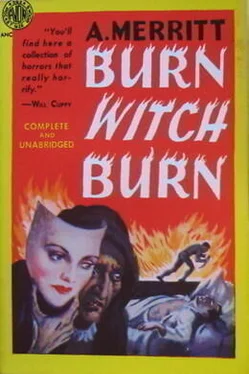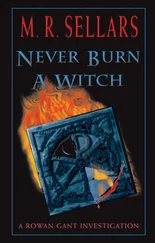I said, severely, so she might not suspect collusion between McCann and myself:
"You ought not to have done that, McCann. If you had shown the doll to her, Mrs. Gilmore would have known at once that she had been dreaming and she would have been spared much pain."
"Well, I ain't a doctor." His voice was sullen. "I done what I thought best."
"Go down and see if you can find it," I ordered, tartly. He glanced at me sharply. I nodded—and hoped he understood. In a few minutes he returned.
"They cleaned out the waste only fifteen minutes ago," he reported, lugubriously. "The doll went with it. I found this, though."
He held up a little strap from which dangled a half–dozen miniature books. He asked:
"Was them what you dreamed the doll dropped on the dressing table, Mollie?"
She stared, and shrank away.
"Yes," she whispered. "Please put it away, Dan. I don't want to see it."
He looked at me, triumphantly.
"I guess maybe I was right at that when I threw the doll away, Doc."
I said: "At any rate, now that Mrs. Gilmore is satisfied it was all a dream, there's no harm done."
"And now," I took her cold hands in mine. "I'm going to prescribe for you. I don't want you to stay in this place a moment longer than you can help. I want you to pack a bag with whatever you and little Mollie may need for a week or so, and leave at once. I am thinking of your condition—and a little life that is on its way. I will attend to all the necessary formalities. You can instruct McCann as to the other details. But I want you to go. Will you do this?"
To my relief, she assented readily. There was a somewhat harrowing moment when she and the child bade farewell to the body. But before many minutes she was on her way with McCann to relations. The child had wanted to take "the boy and girl dolls." I had refused to allow this, even at the risk of again arousing the mother's suspicions. I wanted nothing of Madame Mandilip to accompany them to their refuge. McCann supported me, and the dolls were left behind.
I called an undertaker whom I knew. I made a last examination of the body. The minute puncture would not be noticed, I was sure. There was no danger of an autopsy, since my certification of the cause of death would not be questioned. When the undertaker arrived I explained the absence of the wife—imminent maternity and departure at my order. I set down the cause of death as thrombosis—rather grimly as I recalled the similar diagnosis of the banker's physician, and what I had thought of it.
After the body had been taken away, and as I sat waiting for McCann to return, I tried to orient myself to this phantasmagoria through which, it seemed to me, I had been moving for endless time. I tried to divest my mind of all prejudice, all preconceived ideas of what could and could not be. I began by conceding that this Madame Mandilip might possess some wisdom of which modern science is ignorant. I refused to call it witchcraft or sorcery. The words mean nothing, since they have been applied through the ages to entirely natural phenomena whose causes were not understood by the laity. Not so long ago, for example, the lighting of a match was "witchcraft" to many savage tribes.
No, Madame Mandilip was no "witch," as Ricori thought her. She was mistress of some unknown science—that was all.
And being a science, it must be governed by fixed laws—unknown though those laws might be to me. If the doll–maker's activities defied cause and effect, as I conceived them, still they must conform to laws of cause and effect of their own. There was nothing supernatural about them—it was only that, like the savages, I did not know what made the match burn. Something of these laws, something of the woman's technique—using the word as signifying the details, collectively considered, of mechanical performance in any art—I thought I perceived. The knotted cord, "the witch's ladder," apparently was an essential in the animation of the dolls. One had been slipped into Ricori's pocket before the first attack upon him. I had found another beside his bed after the disturbing occurrences of the night. I had gone to sleep holding one of the cords—and had tried to murder my patient! A third cord had accompanied the doll that had killed John Gilmore.
Clearly, then, the cord was a part of the formula for the direction of control of the dolls.
Against this was the fact that the intoxicated stroller could not have been carrying one of the "ladders" when attacked by the Peters doll.
It might be, however, that the cord had only to do with the initial activity of the puppets; that once activated, their action might continue for an indefinite period.
There was evidence of a fixed formula in the making of the dolls. First, it seemed, the prospective victim's free consent to serve as model must be obtained; second, a wound which gave the opportunity to apply the salve which caused the unknown death; third, the doll must be a faithful replica of the victim. That the agency of death was the same in each case was proven by the similar symptoms.
But did those deaths actually have anything to do with the motility of the dolls? Were they actually a necessary part of the operation?
The doll–maker might believe so; indeed, undoubtedly did believe so.
I did not.
That the doll which had stabbed Ricori had been made in the semblance of Peters; that the "nurse doll" which the guards had seen poised on my window–ledge might have been the one for which Walters had posed; that the doll which had thrust the pin into Gilmore's brain was, perhaps, the replica of little Anita, the eleven–year–old schoolgirl—all this I admitted.
But that anything of Peters, anything of Walters, anything of Anita had animated these dolls…that dying, something of their vitality, their minds, their "souls" had been drawn from them, had been transmuted into an essence of evil, and imprisoned in these wire– skeletoned puppets…against this all my reason revolted. I could not force my mind to accept even the possibility.
My analysis was interrupted by the return of McCann.
He said, laconically: "Well, we put it over."
I asked. "McCann—you weren't by any chance telling the truth when you said you found the doll?"
"No, Doc. The doll was gone all right."
"But where did you get the little books?"
"Just where Mollie said the doll tossed 'em—on her dressing table. I snaked 'em after she'd told me her story. She hadn't noticed 'em. I had a hunch. It was a good one, wasn't it?"
"You had me wondering," I replied. "I don't know what we could have said if she had asked for the knotted cord."
"The cord didn't seem to make much of a dent on her—" He hesitated. "But I think it means a hell of a lot, Doc. I think if I hadn't took her out, and John hadn't happened home, and Mollie had opened the box instead of him—I think it's Mollie he'd have found lying dead beside him."
"You mean—"
"I mean the dolls go for whichever gets the cords," he said somberly.
Well, it was much the same thought I had in my own mind.
I asked: "But why should anybody want to kill Mollie?"
"Maybe somebody thinks she knows too much. And that brings me to what I've been wanting to tell you. The Mandilip hag knows she's being watched!"
"Well, her watchers are better than ours." I echoed Ricori; and I told McCann then of the second attack in the night; and why I had sought him.
"An' that," he said when I had ended, "Proves the Mandilip hag knows who's who behind the watch on her. She tried to wipe out both the boss and Mollie. She's on to us, Doc."
"The dolls are accompanied," I said. "The musical note is a summons. They do not disappear into thin air. They answer the note and make their way…somehow to whoever sounds the note. The dolls must be taken from the shop. Therefore one of the two women must take them. How did they evade your watchers?"
Читать дальше










